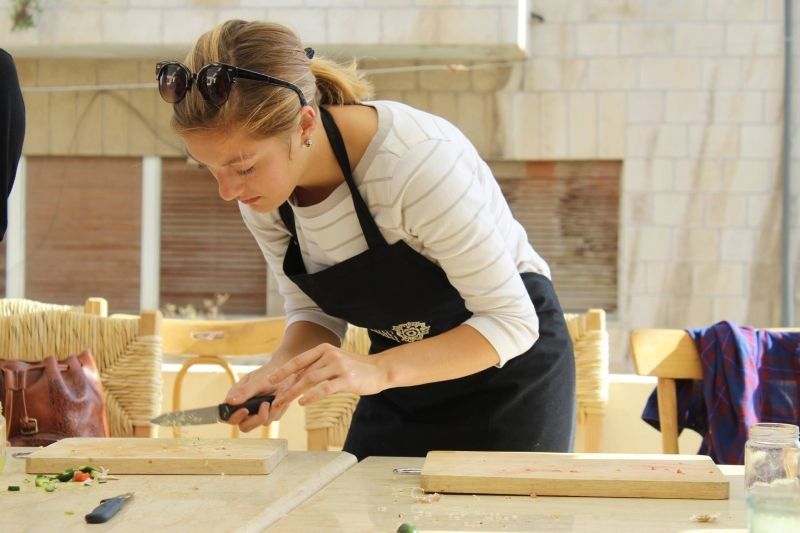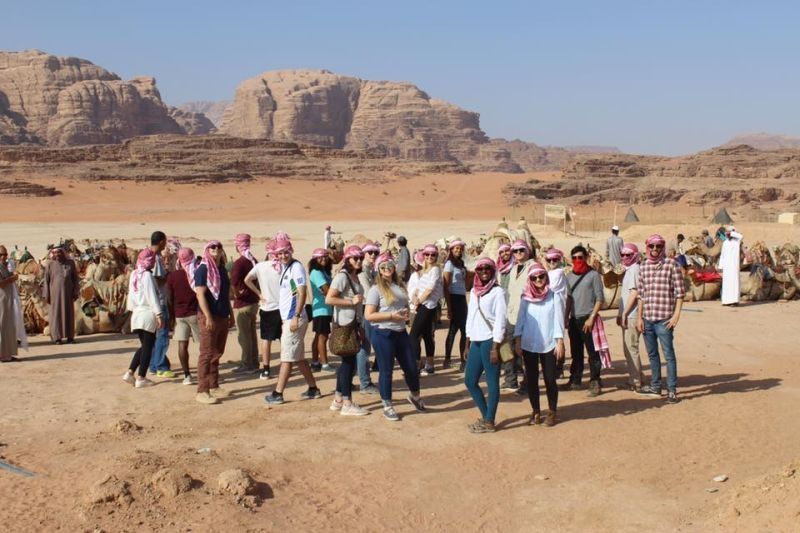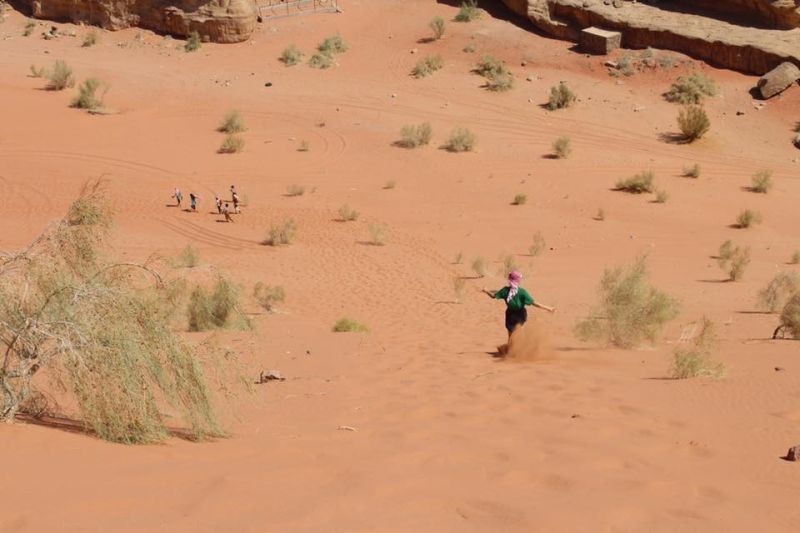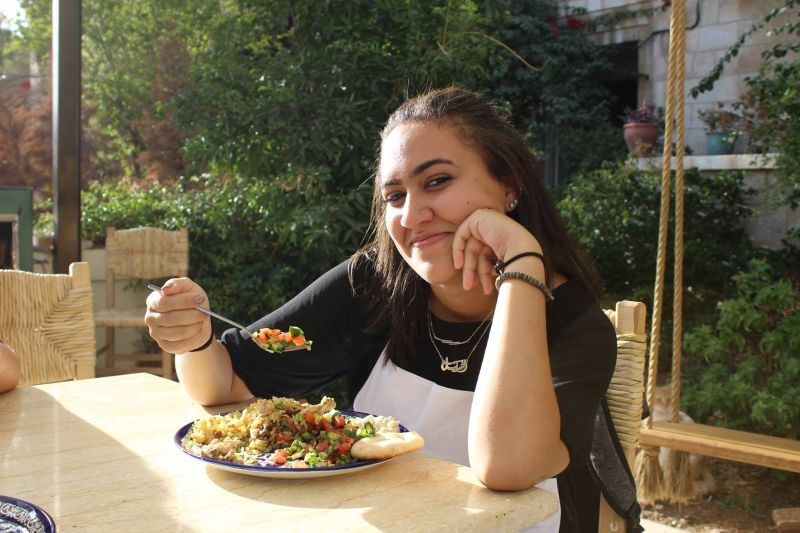Fall 2017 Amman Language and Culture
Intercultural Communication Session I: Our Cultural Lens
CIEE organizes many cultural events to ensure students have opportunities to learn about Jordanian culture. One event I really appreciated was “Intercultural Communication Session I,” which was led by Zeina Alkaraki. This session focused on the cultural lens that we all see through. Cultural lens refers to the various, overlapping identities that shape the way we perceive the world around us. For example, I identify as a Chinese American, a democrat, a woman, a global citizen, etc. These identities influence the way I understand different social and cultural situations.
It is important to be aware of the cultural lens we have. When we first arrived in Jordan, many of us experienced culture shock to varying degrees. In turn, we subconsciously tried to compare the new culture to our own cultural norms. We do this to understand our relationship with our new environment, however, the way we perceive our new environment can be very different depending on how we approach understanding it. We have a tendency to use our own culture as the standard by which we gauge other cultures. It is often too easily to dismiss new cultures and traditions as “archaic” or “weird.” But what is considered “modern” or “normal” is completely subjective.
We are in Jordan to learn, not to confirm our biases. If we truly want to learn as much as possible, we need to limit our expectations and try to peer through others’ cultural lenses. I have heard too many people say Jordan is “so modern!” Yes, Jordan is modern. It’s existing in the 21st century, is it not? Who gets to decide what is considered modern and what is not? People live differently. This does not make one group superior or inferior to another.
We are acutely aware differences. It is likely that we will all have some negative experiences due to cultural differences. It is important to remember that not every negative experience has to become a bad memory. We are all capable of taking what makes us uncomfortable and learning from it. If we recognize our biases, we can ask ourselves why we are feeling uncomfortable. We can also ask others questions about the situation to better understand it.
There is no need for us to like everything about a culture, but we can at least try to look through someone else’s lens and learn a thing or two. That is why we are studying abroad, right? I will leave you with a quote:
“Travel is fatal to prejudice, bigotry, and narrow-mindedness, and many of our people need it sorely on these accounts. Broad, wholesome, charitable views of men and things cannot be acquired by vegetating in one little corner of the earth all one’s lifetime.” –Mark Twain
Stephanie Yim
University of California Davis
Wadi Rum
When we were initially told that we would be riding camels that morning I was skeptical. I assumed that we would take turns mounting one or two camels, then we would pose for pictures while being led around in a circle, and then we would clamber down so that the next person could have their experience on a camel. But there we were, trekking through the desert perched atop our trusty steads with a gorgeous view of the golden desert sand and the towering limestone cliffs that dominated the horizon. The entire journey through Wadi Rum felt like a dream because I could not believe that I was actually there, in Jordan, in the desert, riding a camel as a member of a seventy-person caravan. Laughing and talking with my new friends along the way made the experience feel more real, and strengthened the friendships that were sparked on the trip. It finally felt as if the waves of homesickness that had plagued me since my arrival in Jordan were banished to the past, and the rest of my time in Jordan felt open with possibilities, just like the vast expanse of the desert.
Nicholas Ogrinc
Providence College
Favorite Places in Amman
After spending a month in Amman, I decided I want to write my first journal entry about some of my favorite places in the city, where I choose to spend my time in this chaotic, intricate city. Although I might do similar things when I am back home in California, there is a difference with these settings in Amman.
My favorite segment of the city by far has to be the cute, quaint district of Weibde, characterized to me by its relatively peaceful streets (in comparison to the rest of Amman) and coffee shops where I spend the majority of my time. I’ve basically become a regular at Fann w Shai, where they know Hannah and I by name, and I spend sometimes hours playing backgammon and studying with my friends. Rumi Café, a little bit down the street, is also a favorite of mine, (I’m actually sitting there right now and typing this away!) where their ‘Iranian Tea’ makes me reminisce about the shai my grandma makes. I’ve generally noticed that while these cafes are more westernized, people are much more relaxed and taking their time to smoke cigarettes and enjoy moments with friends, rather than working the day away in attempt to reach maximum productivity under the capitalistic American lifestyle. I enjoy watching the people trickle in and out of these coffee shops and walking around enjoying some of the street art and little artistic stores that remind me of my mom.
Besides Weibde, I enjoy walking through the bustle of Rainbow Street, stopping by Turtle Green Tea house to catch a moment by myself before returning to the noisy scene on the street below. Rainbow Street is just so fun, I’m laughing to myself right now thinking about walking down it while all the cars honk and the men on the street smoke cigarettes and laugh with each other. After a month I still get happy when I see groups of friends, old and new, meeting up and sharing so much affection and warmth with each other. I over hear the “forsa saida’s” and think that if I didn’t know any Arabic I would think these people had known each other their whole lives. This is something that one would definitely not see in America, I think it can be attributed to the differences between an individualist based society vs. a collectivist one. In America, one wouldn’t give the time of day to others they pass along the streets and treat new acquaintances with a forced cordiality, whereas here I see a genuine friendliness and affection between people, that I attribute to the perspective of seeing yourself as part of a societal collective rather than as an individual soul in a sea of others.
The American Center for Oriental Research (ACOR) has also made my list of favorite spots in Amman, despite the slightly brutal hike it takes to climb up to the building. Although there’s not much to do there except drink their free coffee and abuse their free Wi-Fi (which is truly incredible) I really enjoy spending my time on their breezy balcony, studying, reading books, smoking cigarettes, or chatting away with new friends. I’ve noticed that here in Amman I spend most of my time relaxing in cafes and enjoying a chill time with friends through lighthearted conversations, rather than actually taking the time to go out and do something like in America. This internal need of always “doing” something, being productive, accomplishing a task, is not as present in Amman, Jordan as back home. Here I feel that I can allow myself to just be rather than do.
Romteen Borhani
University of California
Santa Barbra
She Fighter
Every Monday and Wednesday, I have the privilege of seeing the strength and beauty of the young women in Amman. I go to the She Fighter gym, an all-women’s gym that teaches women how to defend themselves. Though the fighting style is based primarily on boxing, the self-defense techniques draw from a wide variety of martial arts. The first day I went, all the young women were very welcoming. They asked about what I was studying and what America was like. Since then, they have helped me improve my Arabic and have taught me what being it is like to be a young woman in Amman. I am constantly inspired by their strength and appreciate the warmth with which they welcome me into their place of safety.
Priscila Lopez
Georgetown University
Related Posts
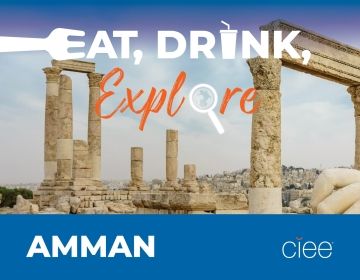
EAT, DRINK, EXPLORE: AMMAN
BEST FOOD TO EAT IN AMMAN With Israel and Egypt on one side, and Syria, Iraq, and Saudi Arabi on the other, it’s no wonder Jordan’s cuisine is so vast... keep reading
Creative Spaces
The bass vibrating in my chest, the beat controlling my arms and legs like a marionette doll, the melody and harmony changing roughly every three and a half minutes -... keep reading
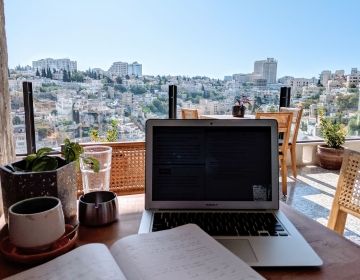
Observations on University in Jordan
CIEE Amman offers us the opportunity to take a class at Princess Sumaya University of Technology. Wanting to meet Jordanians my age, I took the opportunity and signed up for... keep reading
